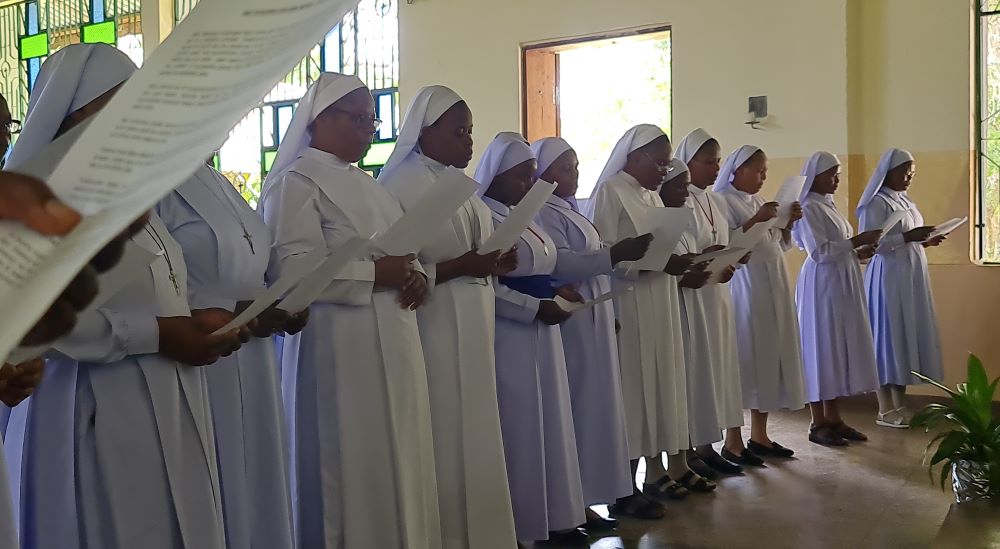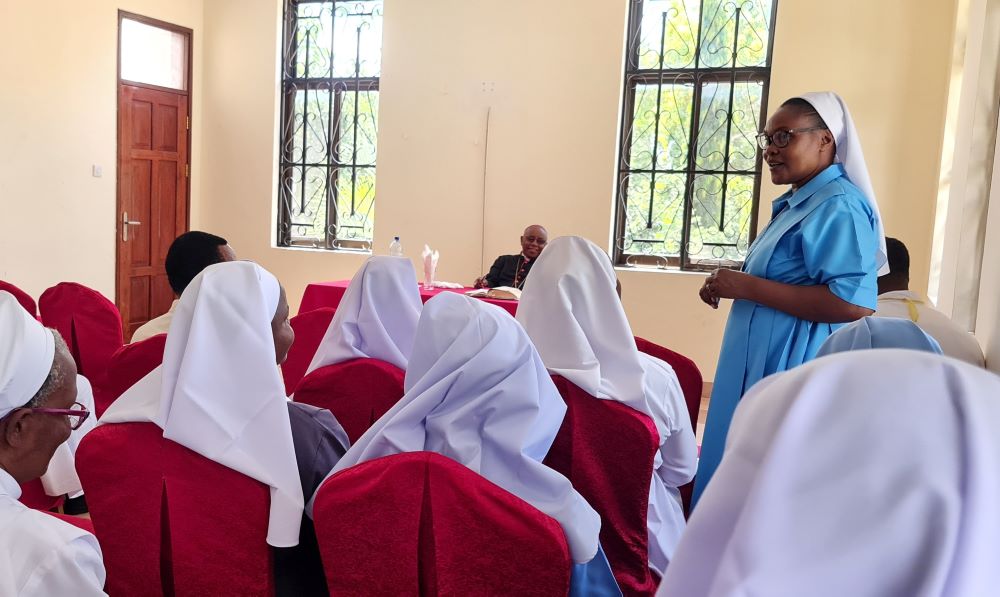
Religious women in the diocese of Zanzibar renewed their vows at the celebration of religious day in Zanzibar, held on the feast of the Presentation of the Lord. (Courtesy of Christine Masivo)
A number of religious congregations serve in the Diocese of Zanzibar under the leadership of Bishop Augustine Shao. As our leader he always ensures that the religious experience a day of prayer every second month of the year.
On the feast of the Presentation of the Lord, Feb. 2, as a symbol of our offering to God and the church's service, he celebrated with us and spoke on Matthew 5:13-16: "We are the salt of the world, and if salt loses its saltiness, it is better to be thrown away." We religious women marked this great day by renewing our vows and celebrating Holy Mass with the Christians at Cheju, a pilgrimage parish in Zanzibar.
In our celebration, the bishop invited us to reflect on our vows by posing the question: "In which way am I the salt of the world and in which way am I the light to the world?"
If we get carried away by the current of social media, or by being "put on a pedestal" by others, our difference from the world is minimized and we might lose the real meaning of being set apart for the service of the church. Bishop Shao reiterated that we need to be different so that people may see it as a testimony. We are not to flow with the current. He challenged us to ask ourselves why religious are different from others, and to let it be not only in our dress, but our being and doing.

Sister Anne Lucy, chair of the religious in Zanzibar, speaks at the celebration of religious as Bishop Augustine Shao listens. (Courtesy of Christine Masivo)
We should ask ourselves: How different are we in the way we do our apostolate? In our concern for the apostolate and the people entrusted to us? The way we love those we live with and serve? The time we offer to listen to people? How we care for the people that we serve?
We have to be wary that we don't become so focused on being builders of structures and institutions that we end up losing the meaning of being religious. At the same time, we have to move with the signs of the time and the needs at hand. As religious, we have to be different and Christ-like, for without this, our life as religious is in vain.
If we give ourselves wholeheartedly to the people, they will know that we are for them and their growth. The people we serve and live with see and feel our service to them. This is the way we become salt of the earth and light of the world for all we serve.
Our testimony should be seen by the lowly and less fortunate. The poorest should see that when they go to church, they will find refuge and have their burden lessened. They will see Christ in our love for them. The life of a religious needs to be very authentic for Christ to be seen even by those who don't believe in him.
As religious we are challenged to see if the desire and motive we had in joining religious life is still there; if not, why did it change? We need to ask ourselves this question to keep our light alive and our salt "tasty."
To be a religious is to be the true salt of the world here in Zanzibar. We need to be different from the world and quench the thirst of the needy, release people from their chains and free them from pain through the service we offer in schools, hospitals, training and rehabilitation centers. We are called to fight for the people and protect them. These days even contemplative religious write books, make items to help people and do tangible things to make a difference in the world.
The bishop stressed that we are not to be ashamed when doing the right thing for the sake of the people, being the voice of those who suffer, and standing up against injustice. He challenged us to ask ourselves if the desire to join religious life is still there, or has it changed? Are we still living our charism?
If children in our schools make high grades, that's fine. But would it make a greater difference if we nurtured weak students to make better grades? Bring the low performers and help them to be better achievers? We are called to help needy children, to mold all-round citizens and better people for a better tomorrow — not to compete with the government.
He asked us to use our creativity to make our apostolate more meaningful and fruitful in helping those in need according to the signs of the time. We need to be open and realize that other people can manage to live religious life; instead of closing down our houses we could welcome those from areas that still have vocations and nurture them. There's no one who cannot learn or be formed.
Besides schoolwork, let our students learn something about our congregations, why we are consecrated, why the church has people of our caliber for service. Not going backwards, but assimilating the way of our founders and living in this current century. Not killing the charism and reason for our founding. Our role as the voice of the marginalized should be a star for us to follow — always. Our chapters should excel in reading the signs of time.
Superiors should dialogue with each sister, not just send transfer letters in the name of obedience; justice has to be exercised through dialogue and listening. Without these, sisters are uncomfortable in new communities or missions. Religious should not be made slaves or robots in ministry, but brothers and sisters willing to serve joyfully, without reservation in their service.
Advertisement
I am convinced that there's no religious life without community, so we need to strengthen each other in the community. We need to pray, live, eat and share together. Frequent community meetings are necessary, and recollection days (preferably with an outside speaker) build up the community.
We should be happy in our community, not only outside our communities; discuss our problems and settle them before things get worse; avoid spoiling each other's reputation. This is the way Christ wants us to live. Be wise in the way we set up local communities: Composition and age gaps should be considered.
A community that grows is one that laughs together and listens to each other. Threatening each other, and sabotaging their gifts is demoralizing, and prevents others from using their gifts. If one is traumatized, her energy is used to shield and heal herself from the trauma, rather than using that energy to develop and be fruitful in her giftedness.
There is danger in not spending time with our community. Everyone needs to be glad to get back to the community and be free to express herself. Our limitations should make us be better religious. Superiors should listen without taking sides or being judgmental.
Finally, communities have to strengthen our prayer lives. If it includes our daily experiences and the needs of our particular place, prayer will make us the real salt and light to the world that we are called to serve.






